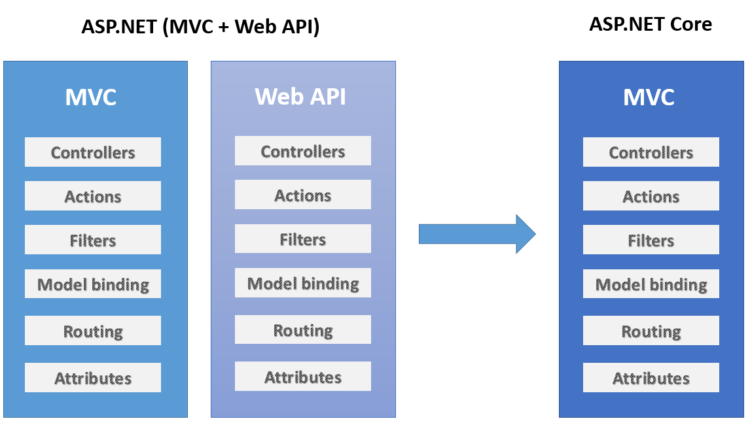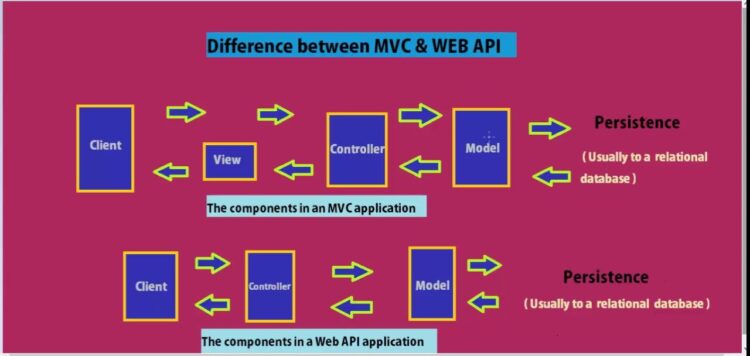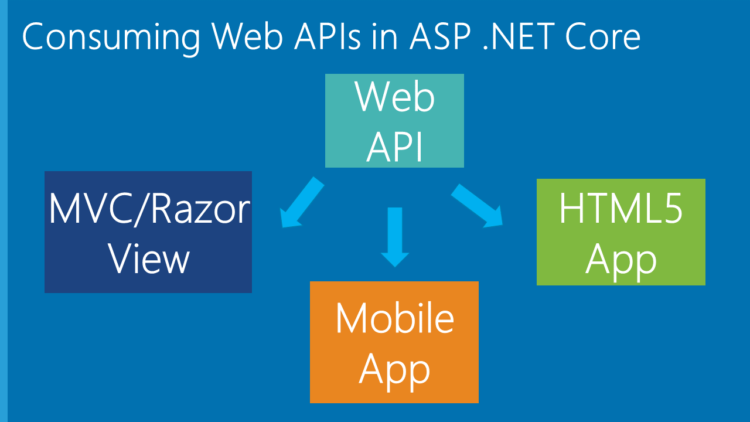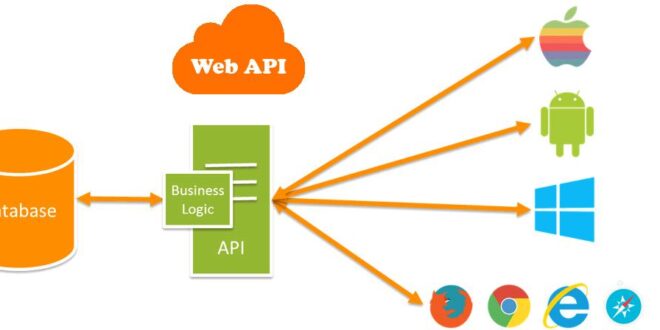When it comes to web application development, people often get confused between Web API and MVC Framework. The MVC framework is generally used for the creation of data and view-based web applications. On the other hand, the Web API framework is meant for the creation of complete HTTP services that are known to return data without the views.
In order to have an in-depth view of Asp.net Web API and MVC, you need to take into account the exposing functionality of their applications. This blog on Asp.net MVC vs. web API will impart you with ample knowledge revolving around the idea of web application development using these technological tools.
What is MVC and ASP. NET Web API?

In the Model View Controller framework, “Model” is responsible for the storage and retrieval of data, “View” is concerned with the displaying of information, and the “Controller” is used for responding and managing the inputs made by the user.
On the other hand, Asp.net Web API is a framework that is extensively used for the development of HTTP services to respond to the requests of the clients. It is a technology that is of open source used to develop web applications. It helps the makers reach out to the clients that stick by the protocols of HTTP. Web API and MVC can be explicitly compared in regards to the web applications’ Exposing Functionality.
Although exposing the functionality of a web application is comparatively preferred to be done with web API, it can be efficiently be carried out with the help of MVC by implementing the action methods. However, before we jump to any conclusions about picking up the best way for functionality exposing, we need to consider some of the criteria. Read on to have a better in-sight to asp.net MVC and asp.net Web API.
Difference between ASP.NET Web API and ASP.NET MVC

1. Exposing Functionality Process:
Asp.net MVC can be taken into consideration for exposing functionality for mainly two reasons. They are:
- If you are looking forward to exposing the functionality of one particular application
- If it is a generic application or functionality
By opting for asp.net MVC, you can actually save time, and you need not create a fresh API for functionality exposure every time. Typically, a controller is always attached to the web application, which further exposes the functionality of the web application that is then quickly consumed via Ajax. However, if you are looking to establish a full-fledged REST service that is not attached to one particular implementation, then you must make use of web API as it helps in delivering neat and elegant solutions.
You need to make your choice wisely. If you figure out the functionality to be View centric or UI similar to that of creating pages driven by Ajax or fragments of HTML, then your ultimate choice should be of asp.net MVC. However, for RESTful services, there is no better choice than web API. Also, if you notice that the functionality of the web application is revolving around data, then you must opt for asp.net web API. For instance, CRUD operations can prove to be the best example of this situation. In the case of the applications that are normal and not data-centric, MVC is just enough to fetch you both views and data without creating any confusion.
2. The format of the data:
With the help of the MVC controller, the results are often derived in the form of JsonResult or ActionResult, which retracts the output in the form of JSON or HTML markup data format. If you want your data results in one of these formats, then you must make use of asp.net MVC, and you can derive adequate results in order to expose the functionalities. However, when it comes to considering multiple data at a time, then you must go for web API as that would make your work easier. We would suggest so because the web API technology makes your work more comfortable as it can automatically decide the format of the web just by taking a glance at the Accept header.
However, that is not the case with MVC, as you have to specifically mention the format of the date prior to writing down the action methods. Web API is generally used in the generation of HTTP services, as we have discussed earlier, which only responds to data. But with MVC, you can fetch replies for both views and data as well. The Web API looks at the Accept Header first in order to decide the format of the data and then reply according to the formats involving JSON, XML, etc. On the other hand, with MVC, the data returning for JSON data format can be done through only and only JSONResult.
3. Combination of Web API and MVC:

Developers can make use of various benefits by combining Web API and MVC Controller. And those benefits include:
- With the help of MVC you can manage the request of AJAX, but return the replies in various formats by making use of web API
- Two different filters can be created for authorizing a particular application. The action name can be mapped by using MVC, while the action verb could be done through HTTP. API can be used as a standalone layer of service, or it can also be combined with ASP.NET
Conclusion:
You can select Web API for generating full-blown service with HTTP such as Amazon or Flickr. It also serves as a great selection if someone needs content negotiation. However, you might not need to require it for all the projects. On the opposite end, MVC provides you a clean variant of concern separation while allowing complete control over the rendered HTML. It also allows for easy Javascript framework integration while enabling a Test-driven procedure for the development needs of a script.
If you are hunting for the best Web API and MVC services, then Saigon Technology is the best option. For more information or to talk to the experts, you can visit the website here.
 Hi Boox Popular Magazine 2024
Hi Boox Popular Magazine 2024



